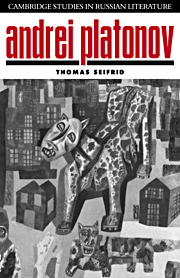Book contents
- Frontmatter
- Contents
- Preface
- List of abbreviations
- Introduction: The problem of reading Platonov
- 1 Consciousness and matter: Platonov in Voronezh and Tambov (1917–1926)
- 2 Learning the language of being (1926–1927)
- 3 Chevengur and the utopian genre
- 4 Platonov and the culture of the Five-Year Plan (1929–1931)
- 5 “Socialist Realist” Platonov (1934–1951)
- Conclusion
- Notes
- Select bibliography
- Index
- CAMBRIDGE STUDIES IN RUSSIAN LITERATURE
3 - Chevengur and the utopian genre
Published online by Cambridge University Press: 27 August 2009
- Frontmatter
- Contents
- Preface
- List of abbreviations
- Introduction: The problem of reading Platonov
- 1 Consciousness and matter: Platonov in Voronezh and Tambov (1917–1926)
- 2 Learning the language of being (1926–1927)
- 3 Chevengur and the utopian genre
- 4 Platonov and the culture of the Five-Year Plan (1929–1931)
- 5 “Socialist Realist” Platonov (1934–1951)
- Conclusion
- Notes
- Select bibliography
- Index
- CAMBRIDGE STUDIES IN RUSSIAN LITERATURE
Summary
Platonov appears to have begun working on Chevengur, his only novel, as early as 1926 when he was still in Tambov. A letter of that year to him from Litvin-Molotov discusses an unnamed work closely resembling what we know as Chevengur, and one of Platonov's 1927 letters to his wife mentions plans for writing a “fantastic story” on “the theme of how history begins and when it will end.” Platonov completed his text, which at this point he was calling Stroiteli strany: Puteshestvie s otkrytym serdtsem, in 1928–1929. By this time he had already established himself as a writer in Moscow with the publication of several shorter works in Novyi mir (two of them fragments of Chevengur), and two books under the impress of Molodaia gvardiia publishers (Sokrovennyi chelovek and Lugovye mastera).
Platonov's novel, however, soon ran into difficulties, perhaps in connection with RAPP's attacks on him in the late 1920s. It was to have been published in 1929 by Federatsiia and had already been typeset but the printing was suspended. Platonov's subsequent appeals to Gor'kii, and the latter's response, have become fixtures of commentary on the novel: Platonov pleads that the novel is not “counterrevolutionary” and asks for Gor'kii's help; Gor'kii pens an equivocal response that praises Platonov's style but laments the plotless nature of his novel and, worse, suggests that no editor would touch a manuscript such as Platonov's, in which revolutionaries are portrayed as “cranks” and “half-wits.”
- Type
- Chapter
- Information
- Andrei PlatonovUncertainties of Spirit, pp. 99 - 131Publisher: Cambridge University PressPrint publication year: 1992
- 1
- Cited by

